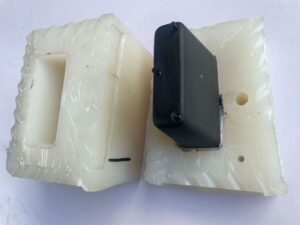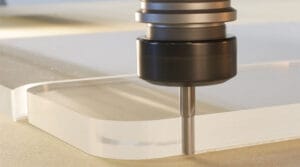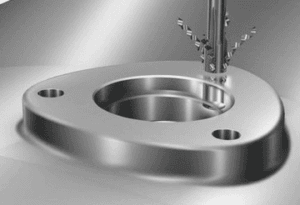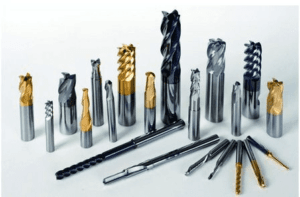CNC machining and injection molding are both popular methods for manufacturing high-quality plastic parts. While injection molding is typically ideal for mass production, it can also be effective for smaller production runs. Similarly, CNC machining also works well for small production runs and offers a range of unique advantages.
However, when choosing between CNC machining and injection molding, there may not be a clear “right” or “wrong” option. Product teams should understand each process well based on specific project requirements, such as cost, design, and engineering needs. This article will help you make the right decision.

Difference between CNC machining and Injection molding
CNC Machining (Computer Numerical Control Machining) is a process where computer software controls cutting tools to precisely cut and shape a block of material, while Injection Molding is a process where molten material is injected into a custom-designed mold to create parts. Let’s compare the key components of these two processes:
Machine
In CNC machining, a CNC machine (or CNC center) is used, which holds and moves cutting tools to shape the material. An injection molding machine is used to force molten material into a mold cavity to form the part.
Tooling
CNC machining uses various cutting tools, but the material is simply clamped onto the machine table. In contrast, injection molding requires a custom mold, typically made from steel or aluminum, which shapes the molten material as it cools.
Material
CNC machining works with solid blocks of material, such as metals, plastics, or wood. Injection molding, on the other hand, uses thermoplastic or thermosetting plastic pellets that are heated until they melt and then injected into the mold.
Process
In CNC machining, rotating cutting tools remove material from a solid workpiece to create the part. In injection molding, molten plastic is injected into a mold under pressure, where it cools and solidifies into the shape of the mold.
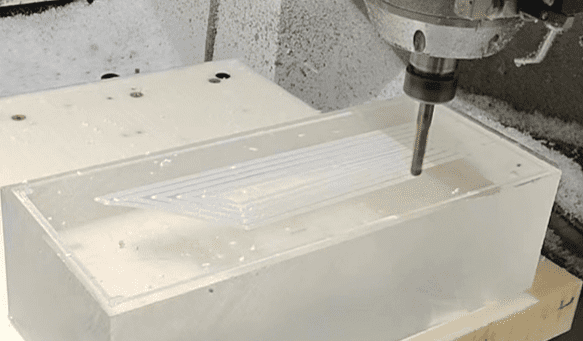

CNC Machining vs Injection Molding: Key Considerations
When deciding on a material for a product, there are several key considerations to take into account, such as cost, volume, quality, lead time, and more. Let us explore these factors when comparing CNC machining and injection molding:
Part Geometry
In terms of Part Geometry, CNC machining offers better flexibility in part geometry than injection molding. for example, some undercut structures on the part may not be feasible in an injection molding process but usually can be made by CNC machining through several steps of machining to let the cutting tool access the undercut area.
Surface quality
For plastic parts, the quality of the surface matters, CNC cutting tools will leave milling marks on the surface of parts and require polish to remove the milling marks manually. the result will be not as good as injection molded parts because of the polishing process done on the steel mold and could get a better surface quality after injection. However, the injection molding process may cause defects on the surface such as sink marks, which means a high demand for the tooling design and injection process.
Part Strength
Injection-molded plastic parts usually have better part strength than CNC-machined parts. this is because plastic Injection Molding allows for the creation of parts all in one piece, and could use proper engineering materials, CNC machining works on plastic blocks which may not be the same materials as injection molding which leads to a weak strength.
Precision
In terms of precision, CNC-machined parts can have better precision than injection-molded parts. this is because due to the shrinkage character of the plastic materials, the injection molding process will have a larger tolerance. Generally, CNC machining can achieve a minimum 0.05mm tolerance while injection molding can achieve 0.1mm tolerance.
Production volume
Injection Molding is commonly for high-volume production because It can produce large numbers of parts quickly and consistently. In contrast, CNC Machining is commonly used for low-volume production because of the long per-part cycle time needed to make every part.
Lead time
injection molding needs to use a steel tooling which needs a long time to manufacture. usually from 8 weeks to 16 weeks for high-volume production. even if rapid tooling with soft steel for Prototype injection molding, still needs around 4 weeks. CNC machining can start with a simple setup, and only takes several days to finish the part. So, in the case of large-volume production, the injection molding process will be the right choice, but in the case of low-volume production, CNC machining will be the right choice.
Cost
Due to the high cost of upfront mold investment of injection molding, If only to produce a few or hundreds of parts, CNC can be cheaper because of no upfront investment. If a large amount of production is needed, injection molding will be cheaper for the piece price even including the mold cost.
Flexibility
CNC Machining offers better manufacturing flexibility. Changes can be made easily by only changing the program and settings of the CNC machine. However, changes for injection molding parts will take a longer time and higher cost of the tooling modification.
Materials
The injection molding process can work for soft materials like rubber which can not be used for CNC machining. However, CNC machining can work on metal materials and injection molding has limitations on metal materials. Generally, A broader range of materials can be used in CNC machining processes than in injection molding.

CNC Machining vs Injection Molding: Key Similarities
We’ve already looked at the differences and key consideration between CNC machining and injection molding. However, there are also some similarities between these two methods. Let’s take a look:
Precision
Both CNC machining and injection molding are known for their ability to create parts with high precision. They are designed to meet exact specifications, which is important in industries where part size and fit are critical. CNC machining uses computer control to achieve precise cuts, while injection molding uses accurate molds and computer-controlled machines to create parts with tight tolerances. So, both methods ensure that products meet strict requirements.
Another similarity is the ability to create complex shapes. Both methods can produce intricate parts, although they do so in different ways. CNC machining removes material from a solid block to create detailed shapes. Injection molding, on the other hand, shapes parts by injecting molten material into a mold. Both can make complex designs, just through different techniques.
Both CNC machining and injection molding offer a wide range of material options. CNC machining can work with metals, plastics, composites, and more, giving manufacturers flexibility for different needs. Injection molding, while mainly focused on plastics, can mold various types of plastic with different properties, such as heat resistance or UV protection. Both methods can handle a wide variety of materials depending on the product’s needs.
Design change
Both methods allow for design changes during production. CNC machining is particularly flexible, making it easier to modify designs as needed. Injection molding can also handle design changes, but it may involve higher costs and longer lead times due to the need for mold change.
Conclusion
In Conclusion, CNC machining is ideal for small production runs and quick design validation. Once designs are finalized, injection molding is more cost-effective for mass production. The choice depends on many key considerations as above. At KUSLA, we specialize in prototype CNC machining, Prototype injection molding, and low-volume injection molding. Contact us to help choose the right process for your project!
FAQ
Is injection molding cheaper than CNC?
Yes, but only for high-volume production, Injection Molding is cheaper than CNC Machining due to faster production rates. For low-volume production, especially lower than 100 pieces, Generally, CNC machining will be more cost-effective than injection molding.
What is the difference between CNC machining and injection molding?
The main differences are in production volume, cost, lead time, and flexibility. CNC machining is better for small to medium runs and offers more design flexibility, but is more expensive per part in large quantities. Injection molding is cost-effective for high-volume production, but has higher setup costs and longer lead times due to mold creation.


